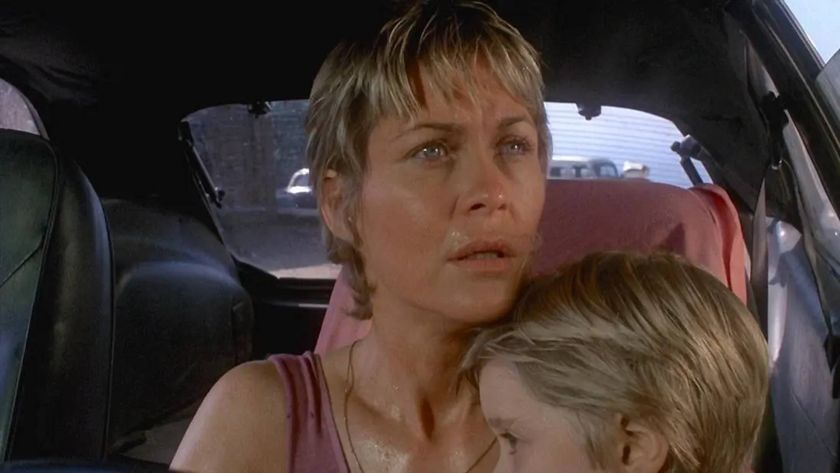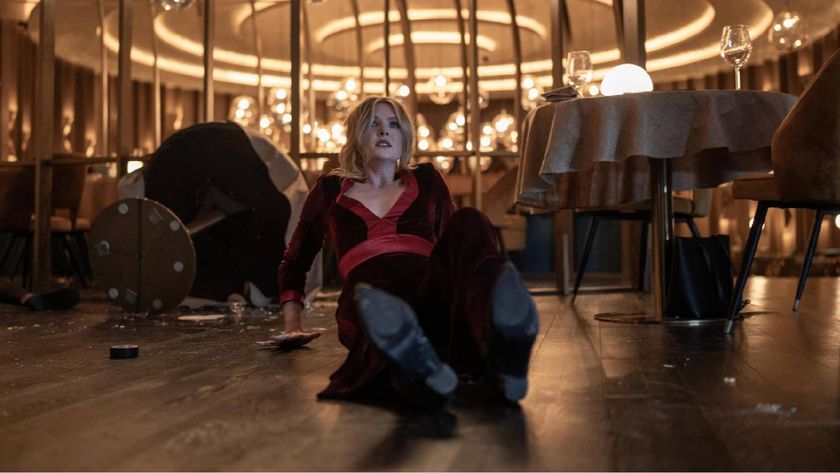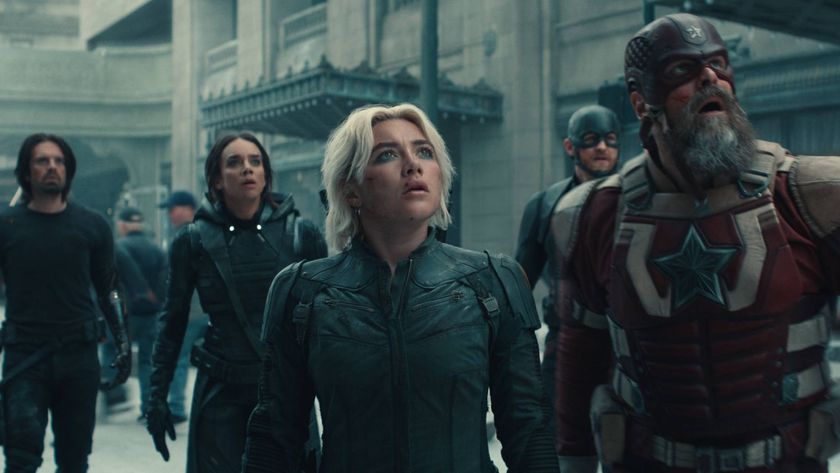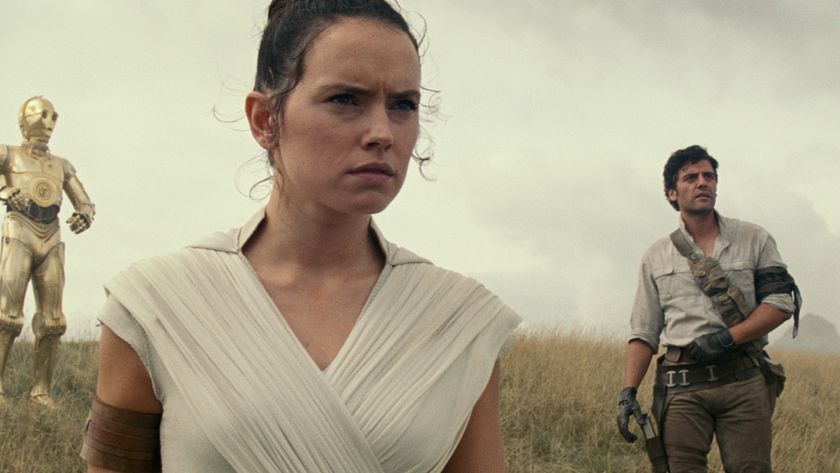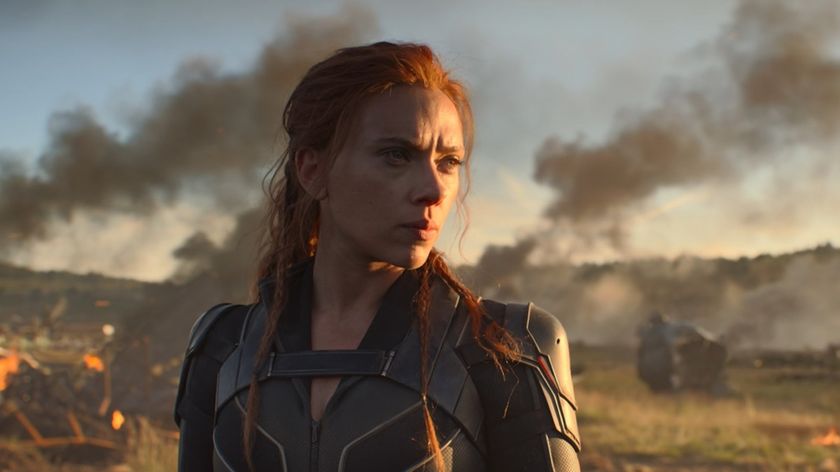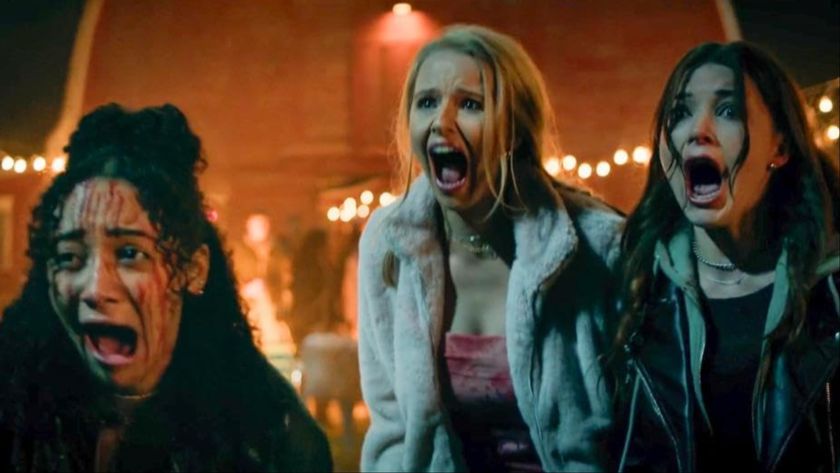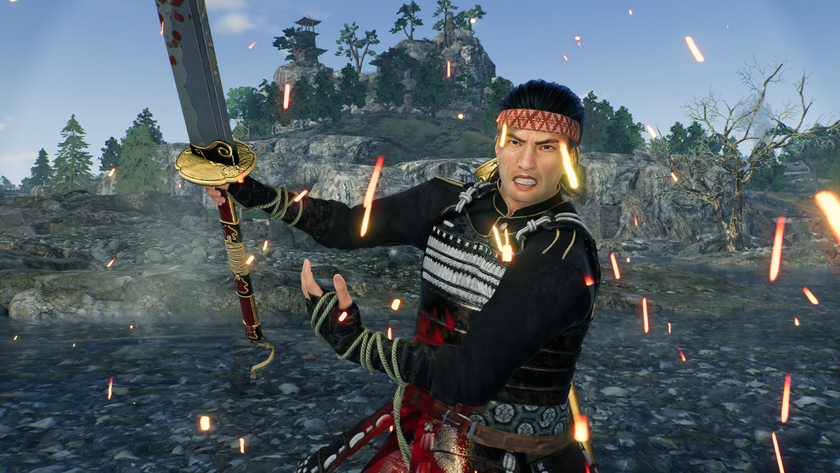Flash Gordon at 40 – An oral history of the epic space opera
As the epic space opera turns 40, SFX assembles six of the key players for an in-depth look at the sci-fi movie unlike any other
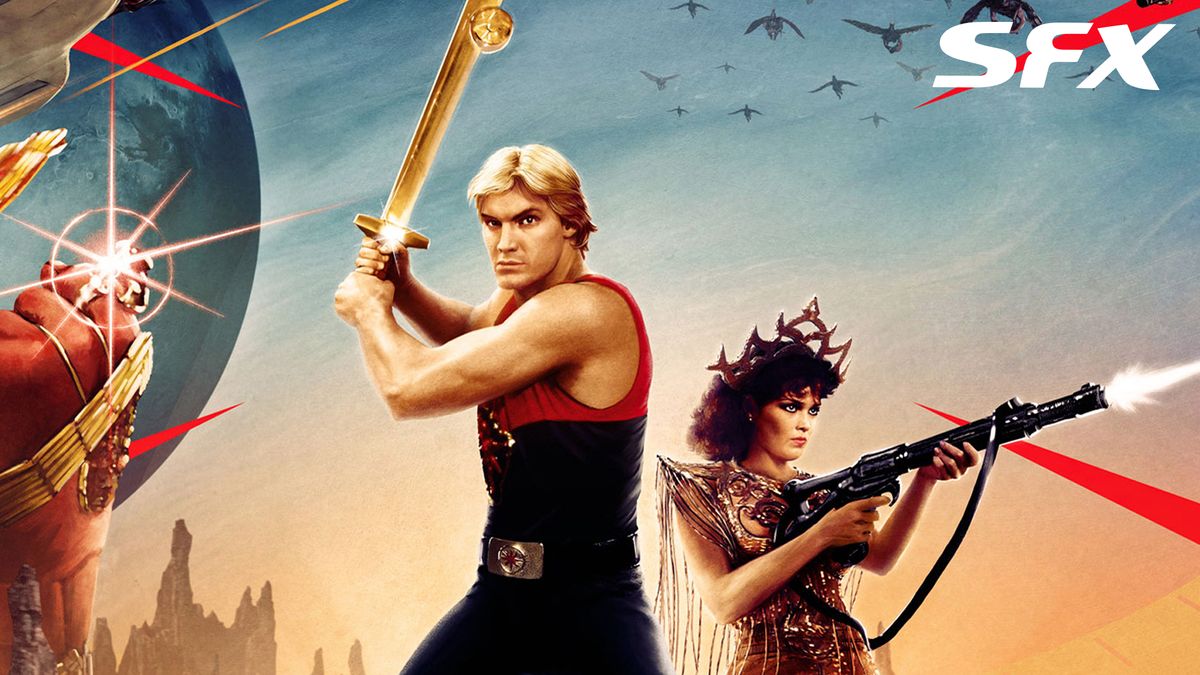
Pathetic Earthlings. Who can save you now? When Ming the Merciless decides to take this obscure body in the SK system as his plaything, unleashing earthquakes, hurricanes and –yes–hothailinour direction, it’s a question with just one answer. He may be just a man, with a man’s courage, but it’s always been good to know that Flash Gordon has forever had our backs. In fact, he’s such a legend that the mere mention of his name is enough to get anyone of a certain age replying with a tuneful “A-aaah”.
Forty years ago, producer Dino De Laurentiis took Alex Raymond’s comic book hero to the big screen for the first time since a popular run of 1930s serials. In the vast universe of space movies, Flash Gordon is unique, a spectacular collision of comedy, larger-than-life performances, spectacular sets and a one-of-a-kind Queen soundtrack. In other words, it’s light years from Star Wars – ironically, George Lucas had wanted to adapt Flash Gordon before creating his own galaxy far, far away – and some of the behind-the-scenes tales are just as strange as the film itself.
So to celebrate four decades of Flash Gordon, SFX has brought together some of the key players to look back on their eventful trip to Mongo. As we join the story, De Laurentiis has just parted ways with director Nicolas Roeg thanks to a real-world threat every bit as insidious as Ming himself: creative differences...
Saviour of the Universe
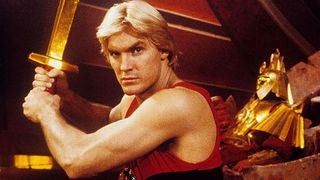
Mike Hodges (director): I was initially asked to make the sequel. That’s when I got introduced to Dino because Nic was a friend, and Dino was looking for a director for the sequel, because they had all these sets built. When Nic left, Dino came to me. I never quite understood why he wanted me [Hodges was most famous at that point for Get Carter], but he did and I’m glad he did.
Sam J Jones (Flash Gordon): Dino brought [a lot of ] the crew in from Italy, all the seamstresses and Danilo Donati, the [Oscar- winning] production designer who did Fellini movies. A lot of times when I would go for a wardrobe fitting they didn’t speak English and I didn’t speak Italian, so it was all body language and a lot of eye contact.
Hodges: Dino flew me to New York to meet Danilo, who had already done quite of lot of drawings as the production designer and costume designer. He was a brilliant, wonderful man, and a very theatrical production designer. It was like shooting a theatre set in many ways.
Melody Anderson (Dale Arden): Danilo Donati should have won an Academy Award. We weren’t even nominated for sets and costumes, but those costumes are so amazing.
Sign up to the SFX Newsletter
Get sneak previews, exclusive competitions and details of special events each month!
Hodges: Of course, Dino and Danilo were very close with each other and I had to really fight to control what I was going to shoot. I decided that the only way I’d manage all this was to relax. So I’d largely wait to find out what Danilo would provide me with in terms of costumes, props and everything, and then I’d make it up as I went along. Once I got the hang of that and the fact that I didn’t have the normal control one would have over a film, I just improvised. I think that’s what gives the film that sense of fun and freedom.
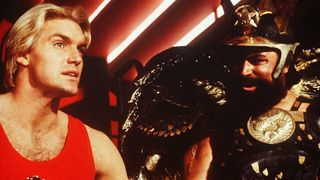
With much of the cast made up of recognisable character actors from the UK and beyond – Max von Sydow, Ornella Muti, Brian Blessed, Timothy Dalton, Peter Wyngarde, Topol and Mariangela Melato among them – the lead roles of Flash Gordon and Dale Arden were taken by a pair of newcomers from the other side of the Atlantic: Sam J Jones and Melody Anderson.
Jones: I think the whole interview and audition process took 10 months or something – it went on and on and on, and then even when they flew me to London it was 30 days of screen-testing before it was all confirmed.
Anderson: It was my first feature and I was so happy to have the job. I was in New York with a friend when the phone rings and it’s Dino. He started telling me, “You have to leave tonight for London, you got the part!” This was September, and I said, “I’m just here for a week, I have no clothes...” “We’ll let you go home at Christmas and get your winter clothes!” he says.
I left that night and we negotiated the contract and all that, and I was zipped off to Shepperton. They immediately dyed my blonde hair black and after that, which I was cool with, [the hairdresser] decided to shave my hairline so it looked like I had a wig on – to which I said, “Why don’t you just put a wig on my head?!”
We did a costume fitting and I was working the next day. It was a six-day schedule, a good 10-12 hours a day, so we were all pretty exhausted. I just flew by the seat of my pants.
Jones: The first day I got on the set I thought, “Oh my god, this is pretty overwhelming!” I realised right then and there that I really had to focus on what my task at hand was. The problem was that I couldn’t really enjoy everything at the time. I would walk onto a set and they’d say, “Hey Sam, they spent a million dollars on that set!” I’d say, “That’s incredible! Now what do you want me to do?!”
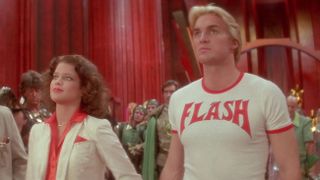
- The best sci-fi movies of all time
Brian Blessed (Prince Vultan): I saw Flash Gordon when I was a child, in black and white with Buster Crabbe, and it was wonderful. I’d always pretend to be Vultan and I never dreamed that one day I’d actually play him in a film! Buster Crabbe was a marvellous Flash Gordon. I tried to get him into the film to be Sam Jones’s father, taking him to the aeroplane at the beginning, but they wouldn’t wear it. It’s a shame because he was over 70 years old at the time and looked wonderful. He’d have been marvellous as Flash’s dad.
Jones: Brian, of course, kept everybody laughing – as you know, he’s very boisterous and a one man show. He was very entertaining, as was Topol, who was always singing on the set. They created a wonderful stress-free environment for everybody.
Blessed: They came out of the blue and told me, “We can’t see anybody else but you to play the part.” They said there were portraits of me all over the bloody studio with wings on. I said that’s what the guy looks like in the comic strip. It was complete fate!
Hodges: The greatest [addition to the cast] was obviously Max von Sydow. He just took to the role and it must have been hell because he must have been out there very early every morning to get his make-up on. But he had such fun doing it. I think that probably after all those Bergman films which were so heavy, it was just a relief for him to play somebody as wonderfully over-the-top as Ming.
Blessed: Max came up to me and said, “I’m going to make my entrance shortly, I don’t know how to play the part.” I said, “What? A brilliant actor like you? I saw you in The Quiller Memorandum as an interrogator, and you cracked your fingers and used your hands, it was incredibly frightening. Ming the Merciless is a magician and a sex fiend, and he’s always having love potions made. He uses his hands all the time!”
I said the performance should come from his fingers and when you watch the film you see Max use his hands a great deal. After that I felt rather big-headed about the fact I advised Max von Sydow how to play his part!
Anderson: I was just in awe of Max, the kindness and the generosity. And his costume weighed so much – it was so complicated for him to sit down that he had to lie on a board to rest his body.
Richard O’Brien (Fico): It was a good cast and there’s something rather charming about the theatricality of the film – the sets and costumes, and the way it’s directed.
Hodges: Whatever film I’m making I try to run a very gentle and light set. I’m not a shouter, so I tend to try and make it interesting and fun for everybody concerned. Certainly I did that with Flash – I think everybody had a good time and I think it shows.
Anderson: Hats off to Mike Hodges – he was spinning so many plates and he was very appreciative when we came to him with ideas. We had such brilliant actors around us that their suggestions came from experience and knowledge. He was just so generous about letting every actor add their own bits and pieces.
O’Brien: Mike was delightful. He looked after what he was doing and he rarely interfered with the actors – if they were doing it wrong then you’d have a little conversation. I was left to my own devices and if I was pulling a face too much or overacting, I’d be told to calm it down a bit. I do remember Tim Dalton playing to the camera when I was behind him, and he kept looking over his shoulder. Mike said, “What are you doing?” Tim said, “I want to know what he’s doing!”
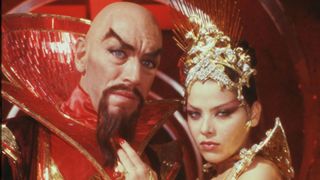
After the departure of Nicolas Roeg and screenwriter Michael Allin, scripting duties fell to Lorenzo Semple Jr – a man who had previous experience of OTT comic book adaptations from his time on the 1960s Batman TV show.
Hodges: Dino didn’t realise for ages that it was funny. The crew used to [crack] up when we ran the rushes and Dino came to me and said, “Mike, why they laugh?” It took ages for him to realise that this was the only way you could play it. You start off with Zarkov having built a rocket in his greenhouse! When Alex Raymond originally started the strip cartoon in the ’30s, we hadn’t contemplated going to the moon, but now we’d landed on it so you couldn’t possibly expect the audience to take it seriously. You had to do it tongue-in-cheek, there was no alternative. That’s what made it fun, I think, because it was so outrageous.
Anderson: It didn’t hit me as being as campy as it was until, I would say, the last third of the film. We weren’t playing it campy, but the lines were so funny you didn’t have to embellish them. We played things as straight as possible.
Hodges: Flash and Dale were the two toughest roles, I think. [Critics] always said Sam Jones was rotten tomatoes, but he was absolutely wonderful as Flash.
Jones: They brought me in for a reason and it surely wasn’t for me to try to be somebody who I’m not. There’s a bit of naïveté with the real me in general, especially back then, and a bit of a purity, and obviously that’s what they wanted to capture on screen.
Hodges: Flash is not the brightest character ever created – he’s extremely naïve in many ways. There was one instance where we were doing the fights on the rocket ship and I ran out of ideas for how Flash could get rid of somebody or other. The first assistant director said, “Why don’t you just have Flash pick up a bar, and have Flash hit him on the back of the head.” Sam Jones turned round and said, “Flash Gordon would never do anything like that!” It was a sweet moment.
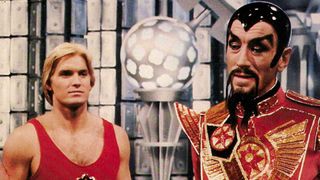
Dino De Laurentiis was a movie mogul in the classic Hollywood mould, whose approach was a little too hands-on for some. It’s fair to say he didn’t always see eye to eye with everyone – and after a dispute with his leading man, Jones wasn’t brought back for reshoots or ADR when the movie returned from its Christmas break in early 1980...
Hodges: Finding a way of working with Dino was my main problem to begin with. I left the film within two weeks of starting it – I told Dino to stuff it up his backside. Then we came together the same day and had a meeting. I said, “Look Dino, if you have any problems, you don’t discuss it in front of the crew, you and I go somewhere.” He agreed and then I worked out a process of actually working with him.
I would have an idea and around five o’clock on the day of a shoot, I’d say: “Dino, I’ve got this idea...” I’d tell him the idea and he’d say, “I think about it, Mike.” Then, the following morning, he’d come and say, “Mike, I have this idea!” and he’d tell me my idea. I’d say, “That’s absolutely terrific, Dino!” so once I’d got this system going with him, I was fine. It was absolutely wonderful.
Jones: I wish I’d had another opportunity to work with Dino because now I have more understanding about him. He was the kind of guy that... You could say he was a control freak. I couldn’t even get a new pair of socks unless he approved it! But that’s the way Dino operated, and he operated that way on hundreds of pictures.
Hodges: Sam got an entourage of agents, managers and PR people and they wanted to renegotiate his contract. Dino was just not having it. When we broke up [for Christmas] I’d shot everything that we needed except for the Hawkmen, so when I went back into the studio, I got a double [of Sam] for some wide shots and I had to re-voice some of the dialogue that had been lost in the battle scenes and things like that. I got somebody basically to impersonate Sam’s voice – most of the dialogue is Sam’s own voice, but some I had to re-voice.
[The dispute] didn’t affect my shooting at all. It did affect, I think, the success of the film in America. Because Dino and Sam and his entourage had fallen out, Sam was not available to do the talk shows and that’s a big deal in America – publicising the film without your main star I think affected it at the box office.
Jones: I don’t think I realised at the time there was pressure on Dino as well to get the film in on budget and on time. But it turned out good. The good thing is, about 20 years later I called Dino and said I wanted to make things right. I just wanted to ask him to forgive me if there was any hostility hovering over us. He was very appreciative. He thanked me for the call and said not to worry, everything’s fine. That’s the last time I talked to him.
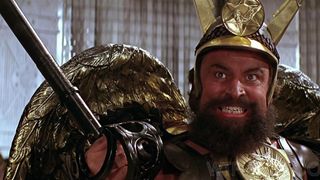
While Flash Gordon didn’t come close to rivalling Star Wars in the international market, it was a smash hit in some countries – especially in the UK, where it outgrossed Raiders Of The Lost Ark. But thanks to its iconic Queen soundtrack, comic book visuals and tongue-in-cheek tone, it’s gone on to become the ultimate cult classic. Sam Jones even got to (kinda) reprise his role in Seth MacFarlane’s Ted.
Blessed: It’s an absolute masterpiece. It’s got a comic style in the writing and in the colour. The acting’s marvellous, everyone’s very well cast, the music is sensational, the camerawork, the lighting, the whole thing is quite amazing. As regards me, the most important thing that ever happened in my life is this expression, “Gordon’s alive!” It makes people cheer up. It’s a clarion call to save the planet in a way, and that’s what we’re doing at the moment, we’re trying to save the Earth from all the dreadful things that are going on.
Anderson: Seeing it on a big screen and with the music and all that stuff was impressive. I felt so much better about the movie after I saw the first screening.
O’Brien: Watching the movie was very like being on the set again, because of the theatricality of the whole thing. It was a big theatrical event being filmed, which is kind of nice.
Hodges: I had to look at it again [for the 40th anniversary re-release] and it holds up. It’s still entertaining and full of detail and inventiveness. I’m glad to say I enjoyed watching it!
Jones: Ted, especially, has brought a younger demographic in, so even the younger generation is watching.
Anderson: Yeah, the grandkids are coming [to conventions] now. How did this happen? And when the family comes in to get an autograph, I say “So children, have you seen the movie?” “No, we haven’t seen it.” I look at the dad and I say, “You’re a bad father! You must bring them into our cult!”
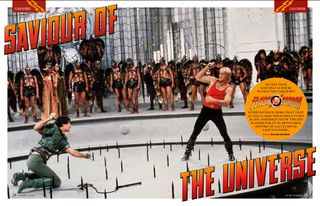
This feature originally appears in SFX magazine – for more, make sure you subscribe to the magazine now!
Hodges: I don’t know [why there was never a Flash Gordon sequel] – but I certainly wasn’t going to make another one! I’d always had this joke ending in my head [inspired by an intentional typo at the end of Hodges’s 1972 movie Pulp], so when Ming vanishes into the ring at the end – literally disappears up his own arse, I suppose you could say –Ijustaddeda question mark.
Anderson: I kind of thought it was naturally going to happen, because the whole thing is set up for a sequel and I know that there were sequels planned. Then all the fou-fou happened [between Dino and Sam], and Universal kind of lost interest.
Sam: I need to pull the contract out – I know exactly where it is – but I’m almost positive I signed a six-picture deal, including the original. It’s never too late!
Blessed: The next film would have been on Mars, in which we would have the Clay Men from the original black and white series. I’d be frozen in a cave somewhere in Mars and Flash would come and find me.
Jones: It’s amazing where Flash has gone, because some very reputable people have acquired the screenplay rights over the years. It was in development at Fox for almost five years. Fox was going to do a live-action, and then Disney acquired Fox, and Disney said no, we’re going to do an animated version [with Taika Waititi attached in some capacity], so that’s where it is right now.
Anderson: And if they ever make another Flash Gordon, I would be thrilled to play the grandma!
A 40th anniversary 4K restoration of Flash Gordon is released on Blu-ray, DVD and download by StudioCanal on 10 August. Read more features like this in the new issue of SFX, our now!
Richard is a freelancer journalist and editor, and was once a physicist. Rich is the former editor of SFX Magazine, but has since gone freelance, writing for websites and publications including 12DOVE, SFX, Total Film, and more. He also co-hosts the podcast, Robby the Robot's Waiting, which is focused on sci-fi and fantasy.
